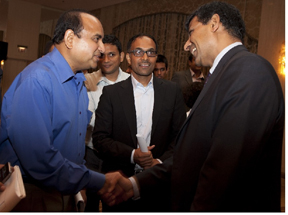
As Non-Residents Indians (NRIs), we play a substantially big role in India’s economy. We do it replete with pride, heart, and soul, albeit with some ego attached. We relate to our motherland internally as our “Karmabhoomi.”
The fact is that we remitted to India $70 billion in 2013 compared to $2.1 billion in 1993, and that is higher than the $28 billion foreign direct investment (FDI) to India in 2013 in terms of foreign exchange.
According to reports, inward remittances form 22-23 percent of the country’s foreign exchange money. Around 25 million NRIs contribute to the Indian economy.
Around three percent of India’s Gross Domestic Product (GDP) is contributed by NRI remittances. Yet, NRIs are neglected from India’s economic strategy by the government. Further, NRIs are taxed unfairly when compared to resident Indians.
Many NRIs expressed to me their pain at the unfair attitude of Government of India (GOI) toward them in resolving various issues, after reading my article in India Post (Sept. 13, 2013). Mr. Sudhir Kaushik (CFO & co-founder of Taxspanner.com) also expressed his anguish in his article in The Economic Times (July 22, 2013).
I continued my efforts and raised the issues when presented with opportunity, when I met RBI governor Dr. Raghuram Rajan, on Sept. 5, 2014 at the Chicago Council on Global Affairs (CCGA) event in Chicago. I asked him, “Why are we NRIs not offered any incentives for remittance as family maintenance, as the amount is consumed within Indian economy?” He replied, “Comparing interest rate on deposits between U.S. (1 percent) and India( 8 percent) , Rajan said, “We welcome NRIs remittance, but India does not need it; remittance is adding to foreign reserves but not to correct India’s current account deficit (CAD). On the contrary NRIs earn lot of money on deposits,” Rajan countered. However, Dr. Rajan was not sure whether NRIs are taxed more than resident Indians.
My question was not related to deposits at all. It is an irony on the part of Mr. Rajan to think that entire remittance is going into deposits. According to Reserve Bank of India (RBI) survey 61 percent of remittance (around US $42 billion) is spent as family maintenance in India, and not left as deposits.
The most common thought NRIs have is, “I send a lot of money to my family; why does Government not offer any incentive to me? Yes beneficiaries receive currency in the form of rupees, but GOI receives foreign currency. When both FDI and NRI remittances generate foreign exchange why is there discrimination for NRIs in terms of incentives? Also compared to the NRI, any FDI investor expects more returns on investments. So outflow will be more than inflow.”
Let me give a classic scenario comparing NRI remittance to the tourism industry. To generate foreign exchange, the Ministry of Tourism spends billions of U.S. dollars to promote tourism in various sectors.
Other policies like “Visa on arrival” have been implemented to promote foreign tourism. According to data, average expenditure by each foreign tourist in India is around US$2,600 (The data is based on number of foreign tourists to Forex earning).
As a result local businesses grow in sales. In this case, tourism promoters are Forex generators, receiving incentives. In case of NRI remittances, the family members who receive remittance as family maintenance are Forex generators too! They spend the received money to support the local business in many ways.
My objective is to raise the concern, not to go against the GOI or Dr. Raghuram Rajan. Hope Prime Minister Narendra Modi will understand NRIs’ contribution to the Indian economy and review NRIs’ taxation and incentivize us by treating us fairly. These steps will help the government in building confidence among NRIs, increasing Forex, and reduce Hawala transactions in the country.
Ram Konduri






